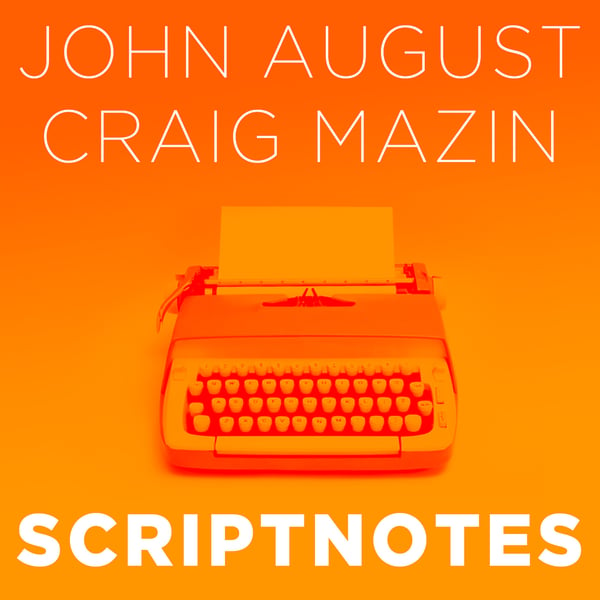615 - The Mind’s Eye
Scriptnotes Podcast
John August
4.8 • 2.7K Ratings
🗓️ 17 October 2023
⏱️ 58 minutes
🧾️ Download transcript
Summary
John and Craig talk about the importance of visualization for screenwriters, and the fact that some very successful writers can’t do it. They share what’s going on inside their brains as they write, their processes for imagining a scene, and what writing is like across the spectrum of aphantasia.
But first, we look at Marvel’s new approach to TV and follow-up on diabetes, studio distribution, and a word John has been using incorrectly for years. We also answer listener questions about choosing the right medium for your story, credit in anthology films, and co-writing credit disputes.
In our bonus segment for premium members, John and Craig discuss the pros and cons of being given the opportunity you’ve always dreamt of.
Links:
- ‘Daredevil’ Hits Reset Button as Marvel Overhauls Its TV Business by Borys Kit for The Hollywood Reporter
- Episode 530: The One with Jack Thorne
- John Green Tweet
- Discovering aphantasia by Austin Kelon
- Aphantasia – A Different Kind of Blindness by Lee LeFever
- Here’s What It’s Like To Not Have An Internal Monologue by Caroline Steber for Bustle
- WGA Membership Department
- Boobie_Klapper on Instagram
- Uniqlo Colorful 50 Socks
- Uniqlo RFID Automated Checkout
- Get a Scriptnotes T-shirt!
- Check out the Inneresting Newsletter
- Gift a Scriptnotes Subscription or treat yourself to a premium subscription!
- Craig Mazin on Threads and Instagram
- John August on Threads, Instagram and Twitter
- John on Mastodon
- Outro by Han Lundberg (send us yours!)
- Scriptnotes is produced by Drew Marquardt and edited by Matthew Chilelli.
Email us at [email protected]
You can download the episode here.
Transcript
Click on a timestamp to play from that location
| 0:00.0 | Hello and welcome. My name is John August and this is episode 615 of Script Notes, a podcast |
| 0:10.4 | about screenwriting and things that are interesting to screenwriters. Today on the show, what |
| 0:14.8 | are you seeing when you read or write or remember? We'll talk about the importance of visualization |
| 0:19.1 | for screenwriters and the fact that some very successful writers can't do it. We'll |
| 0:23.5 | also be answering some listener questions on choosing a medium and directors demanding |
| 0:27.3 | writing credit. And in our bonus segment for premium members, what's it like getting |
| 0:31.7 | what you always dreamed of? We'll discuss the pros and cons of answered prayers. Oh my, answered |
| 0:37.2 | prayers. Oh, okay. We're into the power prayer on the show now. I like it. Yeah, answered |
| 0:43.6 | prayers was the, I think, the famously unfinished or unwritten book by Truman Capote. I was |
| 0:47.7 | always loved that as a title. Well, apparently his prayers to finish were not answered were |
| 0:54.1 | not answered. But a little bit of a news hook this week. So an article was in the |
| 0:58.6 | Hollywood report of this past week, talking about, you know, Marvel changing its whole television |
| 1:03.8 | model, moving the way that they're doing their series from the features division to an actual |
| 1:09.1 | television division and really treating the TV shows more like TV shows. Craig, what did you make |
| 1:14.0 | of this? It was a little bit like reading about a restaurant that said, you know, we're not going |
| 1:20.1 | to make spaghetti anymore using beef. We're going to use, we're going to use pasta to sit there. |
| 1:28.3 | Their method was, look, I'm sure they felt it worked for them or that it was going to work for |
| 1:34.1 | them. I think sometimes when a company is very, very successful, it can begin to embrace the |
| 1:41.3 | delusion that everybody else is dumb and their way is always better and sometimes break things, |
| 1:47.2 | move fast and break things. Well, in the case of the way they were doing their television, |
| 1:52.0 | it wasn't working. It wasn't working creatively. I don't think for a number of those shows by their |
| 1:56.4 | own admission, it seems. And it also wasn't working procedurally for the people that were working |
... |
Transcript will be available on the free plan in -531 days. Upgrade to see the full transcript now.
Disclaimer: The podcast and artwork embedded on this page are from John August, and are the property of its owner and not affiliated with or endorsed by Tapesearch.
Generated transcripts are the property of John August and are distributed freely under the Fair Use doctrine. Transcripts generated by Tapesearch are not guaranteed to be accurate.
Copyright © Tapesearch 2025.

